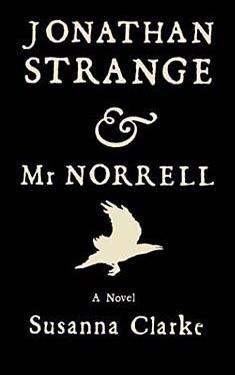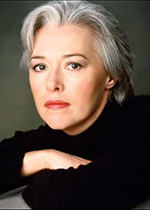WoGF Review: Jonathan Strange & Mr. Norrell by Susanna Clarke
 Alix Heintzman (alixheintzman) recently earned herself a graduate degree in history from the University of Vermont, and has circled back to her Old Kentucky Home with her partner Nick Stiner. She spends her time semi-desperately repairing the abandoned house they just bought, writing history high school curriculum, and reading fantasy books. She reviews books on her blog, The Other Side of the Rain, and is a staff reviewer at Fantasy Literature.
Alix Heintzman (alixheintzman) recently earned herself a graduate degree in history from the University of Vermont, and has circled back to her Old Kentucky Home with her partner Nick Stiner. She spends her time semi-desperately repairing the abandoned house they just bought, writing history high school curriculum, and reading fantasy books. She reviews books on her blog, The Other Side of the Rain, and is a staff reviewer at Fantasy Literature.
 However Jonathan Strange & Mr Norrell has been described to you—Jane Austen mixed with Harry Potter, or Dickens dusted with Phillip Pullman—it isn’t any of those things, because it isn’t like anything else. Jonathan Strange is a beautifully-wrought story filled with half-remembered fairy tales and shadowy woods and madness. It is one of my very favorite fantasy novels. It is also one of the most brilliant historical novels I have ever read.
However Jonathan Strange & Mr Norrell has been described to you—Jane Austen mixed with Harry Potter, or Dickens dusted with Phillip Pullman—it isn’t any of those things, because it isn’t like anything else. Jonathan Strange is a beautifully-wrought story filled with half-remembered fairy tales and shadowy woods and madness. It is one of my very favorite fantasy novels. It is also one of the most brilliant historical novels I have ever read.
“Some years ago there was in the city of York a society of magicians. They met upon the third Wednesday of every month and read each other long, dull papers upon the history of English magic,” (1).
In the first two sentences, we are introduced to the two major premises of the book: That the English past had magic, but its present does not. Under the rule of the Raven King, the Middle Ages were a time of powerful magicians and unruly faeries. But the Raven King abandoned England, and magic slowly seeped away from the country. By 1806, magicians are old men in wigs who study magical history and debate the theoretical application of spells (the books magicians study, like Lanchester’s Treatise concerning the Language of Birds or Strange’s The History and Practice of English Magic, are endearingly described in footnotes throughout Jonathan Strange).
Mr Norrell is a scholarly hermit who discovers that magic is suddenly possible again. He awes the public with the first display of practical magic in several hundred years, and rises to prominence as a magician in service to the English government. He’s a possessive, un-charming man who spends a great deal of time hoarding magical texts to prevent the uneducated masses from getting any dangerous ideas of their own. Jonathan Strange is a wealthy, feckless young gentleman who takes up the study of magic chiefly to impress a woman with his seriousness of character. Strange becomes Norrell’s only apprentice, and the plot follows their fractious relationship through the Napoleonic Wars. Behind their comedy of manners, another plot is building powerfully: English magic is growing stranger and more dangerous, and there are whispers of the Raven King’s return. In a particularly eerie scene, a ragged street-magician reads the future in a deck of tarot cards. Each card he lays on the table is the Emperor, and each tiny king looks younger, wilder, and darker. A raven perches on his shoulder.
As a fantasy novel, Jonathan Strange and Mr Norrell is very nearly perfect. It’s almost 900 pages long; Novels of that length are usually sprawling messes of epic fantasy, filled with as many unnecessary side-quests as a video game. But the plot moves beautifully and unpredictably. The characters are, as reviewers love to say, flawed and human, but not to the degree that they’re unlikable. Most importantly, Susanna Clarke creates that creeping feeling of otherness and magic that gives fantasy novels their sense of wonder. I, too, want to wander “on the other side of the rain.”
 As a historical novel, it is even more exceptional. Academic historians have deeply mixed feelings about historical novels. On one hand, it’s rather nice to see your complicated, tiresome subject of study neatly bundled into a novel. On the other hand, it can be painful to watch a novelist bumbling through the cities and times you know so well, like tourists gawping at the local sights. But Jonathan Strange doesn’t treat history as romantic backdrop or an excuse to wear ball gowns. Nor does it lean on historical events to provide plot and meaning. Instead, Jonathan Strange engages playfully and cleverly with the past, and toys with our sense of historical memory.
As a historical novel, it is even more exceptional. Academic historians have deeply mixed feelings about historical novels. On one hand, it’s rather nice to see your complicated, tiresome subject of study neatly bundled into a novel. On the other hand, it can be painful to watch a novelist bumbling through the cities and times you know so well, like tourists gawping at the local sights. But Jonathan Strange doesn’t treat history as romantic backdrop or an excuse to wear ball gowns. Nor does it lean on historical events to provide plot and meaning. Instead, Jonathan Strange engages playfully and cleverly with the past, and toys with our sense of historical memory.
In the most basic sense, Clarke has her facts straight: the politics and events of early nineteenth-century Britain are accurate, and integrated smoothly into her characters’ lives. But her real historical brilliance is a subtler thing: Clarke has the ability to recreate an historical culture. Her England has a tangible texture to it, and even its own kind of character. One chapter begins with a description of the political atmosphere of 1807:
“It was a difficult time to be a Minister. The war went from bad to worse and the Government was universally detested…It was not that the Ministers were dull-witted—upon the contrary there were some brilliant men among them. Nor were they, upon the whole, bad men; several led quite blameless domestic lives and were remarkably fond of children, music, dogs, and landscape painting…But in spite of all these virtues and abilities none of the Ministers’ plans to defeat the French ever seemed to come to anything and even their cleverness was complained of. Country gentlemen who read in their newspapers the speeches of this or that Minister would mutter to themselves that he was certainly a clever fellow. But the country gentlemen were not made comfortable by this thought. The country gentlemen had a strong suspicion that cleverness was somehow unBritish. That sort of restless, unpredictable brilliance belonged most of all to Britain’s arch-enemy, the Emperor Napoleon Bonaparte; the country gentlemen could not approve it,” (70).
This is a caricature of English attitudes, but it’s a caricature drawn by someone who knows them well, in loving detail: the fondness for landscape painting, the tension between urban and rural classes, the almost-admiring vilification of Napoleon. I’m particularly thrilled when Clarke lets a little cultural criticism leak through, as in her description of an English family vacationing in Venice:
“But the sad decay, which buildings, bridges and church all displayed, seemed to charm them even more. They were Englishmen and, to them, the decline of other nations was the most natural thing in the world. They belonged to a race blessed with so sensitive an appreciation of its own talents (and so doubtful an opinion of any body else’s) that they would not have been at all surprised to learn that the Venetians themselves had been entirely ignorant of the merits of their own city—until Englishmen had come to tell them it was delightful,” (619).
Clarke’s cultural criticism has more serious layers. Historical novels tend to give us the stories of the empowered classes. In British historical fiction, we have hundreds of Elizabeth Bennets and Sherlocks, but many fewer figures from the lower classes, and virtually no nonwhite characters. If you’re tempted to shrug off the accusation of whiteness, let me note that nineteenth century Britain was not an exclusively white space; It was the clamoring, conflicted center of a vast empire, which had spent the last several hundred years neck-deep in the Atlantic Slave Trade. In Jonathan Strange and Mr. Norrell, Clarke gives us three significant characters with less Austen-ish backgrounds: Vinculus, an oracular street dweller; Childermass, Norrell’s enigmatic manservant; and Stephen Black, the black servant of a prominent politician. They aren’t the comic relief or the charming side-story. They don’t offer folksy wisdom to Strange and Norrell when they’re feeling down. Instead, these three characters are working towards their own ends, in a sort of backstage world largely unnoticed by the upper classes. The thus-far-imaginary sequel to Jonathan Strange is rumored to follow Vinculus, Childermass, and Black entirely.
But it’s not just Susanna Clarke’s familiarity with historical culture that makes the book so powerful. It’s also the way she makes her readers feel a sense of longing for a historical past we never had. In a clever meta-narrative, we’re reading a book about a magical past, with characters who are obsessed with their own magical past. They long for the Raven King’s return, and the return of their Golden Age of magic. As Childermass says, “‘I am a North Englishman, Mr Lascelles. Nothing would please me better than that my King should come home. It is what I have wished for all my life,” (770). Our own historical memories are filled with heroes and battles, colored by the soft glow of nationalism. The present seems drearily full of grocery shopping and congressional hearings and Facebook updates, by comparison. And so, in some delightful, magical way, Clarke makes us all into northerners waiting for the Raven King to return, and bring back our own imagined histories.



















 Full Details
Full Details


1 Comment
Great review! I loved this one as well: it’s looking like my favourite read of 2013 so far.
That’s a very insightful analysis of Childermass’ nostalgia for the Raven King.
Sorry, the comment form is closed at this time.